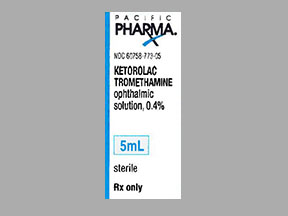
Acular Ls Coupons & Savings Card – Discount Prices from $25.24
Brand for: Ketorolac
My prescription
Edit
5ML of 0.4%, Ketorolac (1 Bottle)
Select pharmacy

CVS
$91.03
COUPON PRICE
Walgreens
$25.24
COUPON PRICE
Walmart
$54.01
COUPON PRICE
Albertsons
$58.60
COUPON PRICEAcular Ls savings card
Show this card to your pharmacist
Walgreens
$25.24
BIN
ID
PCN
GRP
011867
LH4A18939B
HT
LABH001
Powered by
More prescriptions for pain
More prescriptions for pain
Price history for Acular Ls (brand) & Ketorolac (generic)
1 Bottle, 5ML of 0.4%
Average retail price for Acular Ls
Average retail price for Ketorolac
Average SaveHealth price for Ketorolac
Our price history data is based on aggregated prescription data collected from participating pharmacies in America. Our prescription data updates daily to reflect the latest price changes. If you notice a missing data point, it means there wasn't sufficient data available to generate a monetary value for that date.
Over the last 12 months, the average discount price of Acular Ls is $68.26 using the SaveHealth savings card. That's an average savings of 79.96% on Acular Ls with our discount card.
*Retail prices are based on pharmacy claims data, and may not be accurate when we don't have enough claims.
Acular Ls (Ketorolac) dosage forms
Dosage Quantity Price from Per unit 5ML of 0.4% 1 Bottle $54.01 $54.01 5ML of 0.4% 2 Bottles $105.52 $52.76 5ML of 0.4% 3 Bottles $163.54 $54.51
| Dosage | Quantity | Price from | Per unit |
|---|---|---|---|
| 5ML of 0.4% | 1 Bottle | $54.01 | $54.01 |
| 5ML of 0.4% | 2 Bottles | $105.52 | $52.76 |
| 5ML of 0.4% | 3 Bottles | $163.54 | $54.51 |
What is Acular LS used for?
Acular LS is used to relieve eye itching caused by seasonal allergies and to reduce inflammation and pain following eye surgery. It is a nonsteroidal anti-inflammatory drug (NSAID) in the form of eye drops.
What do ketorolac drops do for your eyes?
Ketorolac eye drops are used to relieve eye pain, irritation, and inflammation. They are often prescribed after eye surgeries or procedures to help reduce discomfort and swelling. Additionally, they can be used to alleviate symptoms associated with seasonal allergies affecting the eyes.
Is Acular LS a steroid?
Acular LS is not a steroid. It is a non-steroidal anti-inflammatory drug (NSAID) used to relieve eye itching and inflammation.
Are ACULAR eye drops an antibiotic?
ACULAR eye drops are not an antibiotic. They contain ketorolac tromethamine, which is a nonsteroidal anti-inflammatory drug (NSAID) used to relieve eye itching and inflammation.
Are ketorolac and ACULAR the same?
Yes, ketorolac and ACULAR are related. Ketorolac is the active ingredient in ACULAR, which is a brand name for the ophthalmic solution used to relieve eye itching caused by seasonal allergies.
